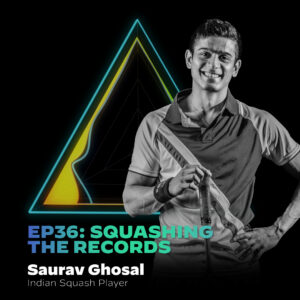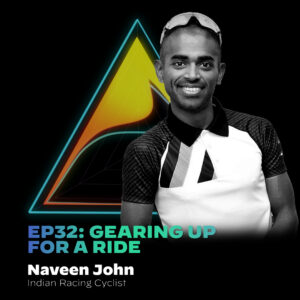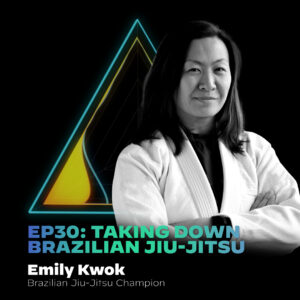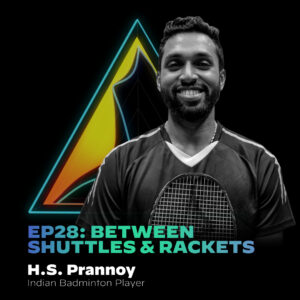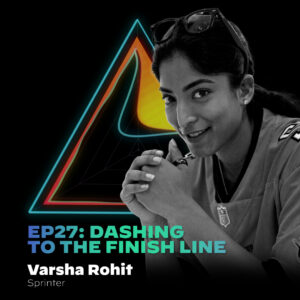Introduction Of Podcast
In India, it is not easy making it to the top in sports and athletics and especially for women, who have to face a bunch of stereotypes along the way. But in this episode, Neha Agarwalla outlines how with sheer will, discipline and determination, it is really possible to go all the way. Tune right in.
Timestamps
(00:00 – 00:45) – Introduction
(01:11 – 04:01) – Neha’s Journey Into CrossFit
(04:38 – 07:55) – Neha’s Journey With Workout and Nutrition Myths
(08:31 – 10:54) – Training vs Competition Mindset
(12:12 – 16:23) – Neha’s Fuelling Strategies
(19:12 – 23:08) – Technology’s Role In Nutrition and Neha’s journey with CGM
(24:14 – 28:54) – 5 Best Tips For Anyone Starting Their Fitness Journey
Key Takeaways – Transcripts
Intro (Mohit): In a country where women struggle for opportunities and a platform to prove their mettle to the world we have with us today. Neha Agarwalla, a former Indian CrossFit competitor, was ranked fittest in India during the CrossFit Open in 2018 and remain in top three for a few years before and after. Neha has defied all the conventional norms in India and made a name for herself in the fitness ecosystem, inspiring a generation of women to take up fitness seriously. We discuss with Naha the various obstacles she had to overcome and how she entered the world of CrossFit and competed with some of the world’s best and world’s fittest and top athletes. Let’s dive deep into it.
Question (Mohit): Hey, Neha, really nice connecting with you as well. I think Vatsal who’s my co-founder. He has been telling me about you. He’s into CrossFit himself. I admire CrossFit a lot, but primarily from the Brazilian Jiu-jitsu background. So two different ends of the world, but really admire the tenacity and the amount of effort that it takes to actually do something as intense. I think, to begin with, how did you get here, right? I mean, between everything else, essentially, how did you end up with CrossFit? What’s your story?
Answer (Neha): I was fresh out of college. I just returned from the UK, and I was asking people around with gym, should I join? And I didn’t even know the concept of CrossFit or how it functions at all. One of my friends had gone to CrossFit gym very close to my house, and he was like, you should check it out, it’s really cool. So I was like, yeah, sure. I walked in and I had literally zero expectations, right? So there was a group workout, there was a lot of push ups, sit ups, squats, and all I had ever done before was gone to a regular gym where I did three days of strength and two days of cardio. And of course, in the strength, they were always telling me to lift lightweights because I’m a woman and I don’t want to get bulky and things like that. So I came from that background and here suddenly there was like, no distinction. It wasn’t like, you’re a woman, so you don’t take the weights, right? It was like, everyone is going to use the same weights. So I did my workout and like, wow, that was just so much fun. That’s exactly what I felt on day one. So I went home and I was like, okay, cool, I’m definitely going to get the so I immediately bought the annual membership. I was like, I’m sold. Like, I want to do this. And after that day, I was someone, even though I did work out regularly, it wasn’t a big part of my life. And I was never athletic growing up, so it’s not like I played a lot of sports or anything. I was like, okay, like this. So I would start centering my entire life around my CrossFit class in the evening. Like, I would make sure if dinner plans are there, they are delayed so I can go for my class if there’s a meeting at work. I was working with my father. I would leave work early to go to my class and I was like, obsessed with CrossFit. I did it six days a week and I don’t want to ever stop doing it. And the CrossFit gym that basically I went to, I didn’t really particularly love the way they ran it. I felt like a better job could have been done and I was not very happy working with my father. So I suddenly felt like I found what I love, but I didn’t have the confidence to feel like I can coach. I thought, okay, I can just own the gym and maybe look after the admin part of it. So I partnered up with one of my coaches and I was like, you can look after the training part of it and I’ll be the business part of it. We started the gym and he was like, you should just do your CrossFit level one, because what if we need help with coaching? You can take a few classes here and there. So I was like, okay, I guess that makes sense. So I did my level one and I started coaching and I started getting the hang of it and I started enjoying it a lot. And suddenly I was like, okay, no, forget the business part. I just want to be a coach full time, right? So I did my level two. I did my level three simultaneously. I competed in the CrossFit Open and I always did pretty well. Like, I would always rank the third, 2nd, 1st in India, always remain in top three. All the years that I competed. By chance, I found it and immediately realized that this is what I love and I love doing it even to this day. Even though I like my CrossFit gym shut down a month ago. I don’t enjoy going to a normal gym anymore. It’s just not as fun.
Question (Mohit): Yeah, fun sounds interesting. And you also mentioned along the way that when you saw the first gym, when you went into the first gym, when you came back from your studies and there were so many myths actually these still exist, built around that women shouldn’t lift heavy weights and that too CrossFit, right? I’m sure there would be some myths around CrossFit as well. What was your mindset back then, essentially? How did you think about those things? And it’s actually a big problem because we actually talked to a lot of beginners or ourselves as well as well realize that these myths around that weight training leads to bulking up. And basically if you consume more protein, it affects your kidneys. These are like very generalized myths, essentially, right? So how do you think about and basically think around that point in time.
Answer (Neha): So I think the one thing about me was from childhood, I was someone that if someone told me I can’t do something because I’m a girl or this or that, I would like to question it for sure. I wouldn’t just be like, who they said it, so I shouldn’t. So I was quite actually excited about being pushed and not made to feel like I can’t do certain things. And about the bulking up part, I wouldn’t say it didn’t bother me because what happened was, I think what happens when people start doing CrossFit, the workouts are really high intensity, right? Like you’re destroyed by the time you’re done with the session, at least the first few months when you’re not used to it and when you come back home. And then you feel like, oh, I worked out so much, so I can eat whatever. I feel like a lot of people do this, they work out a lot and then they eat whatever they feel like. And then obviously they gain weight because they’ve been eating too much. So you start looking a little bigger, but you convince yourself that it’s the weight training that’s causing it. So it happened to me. Like, I had this phase where I was doing CrossFit and I was eating whatever I felt like I wasn’t taking care of my nutrition. It’s something I’d never really ever taken care of. In the beginning, I got pretty big and obviously a lot of people started commenting, especially my friends who didn’t weight train, like the girls and stuff. They were like, do you think you’re looking a little bulky and stuff? I became very conscious. I was like, oh, God. But I obviously don’t want to stop doing CrossFit because I loved it too much. So that’s when I started researching, then what should I do? And started researching nutrition on my own, like macros, and trying to figure it out. Of course I made a million mistakes, but I also learned quite a bit trying to figure it out on my own. So I started tracking all my food intake. And I would say that I definitely underate for a while because of the stigma of being too big. But it also taught me a lot about how to manage my protein intake and stuff. And when I did that, my body changed a lot. I got suddenly, I got very lean. Suddenly everyone was like, oh, what are you doing? Wow! You are you looking amazing. Because I was still weight training, but I was looking a lot leaner. Obviously, I went from one extreme to another extreme. Like I overdid with my nutrition. I was controlling every single thing purely for the aesthetic part of it. Eventually, basically, I got introduced to the CrossFit world. I did not know that there were CrossFit athletes out there and these champions and stuff. So someone told me, well, check out these YouTube videos, these CrossFit Games athletes, they compete and they’re amazing. This was back in 2013-2014. So I checked some videos, and I was amazed. I was like, I did not know that that caliber of athletes exist in CrossFit. And suddenly my goal is to switched from like, okay, cool looking lean is fine. You get the compliments for a bit. But I don’t want to just be that. Like, I want to be stronger. I want to be better. So I started focusing more on not what my body looks like, but rather what it can do. So can I do handstand push ups? I want to get pull ups. I want to get muscle ups. I want to snatch my body weight. And I wouldn’t say that I’m completely detached to the way I look now, but I would say that I care a lot more about how I move and how fit I am. So everything else just takes a backseat. So that’s kind of how I work around that entire muscular thing that my goals changed. It stopped being just about how I look.
Question (Mohit): That’s really interesting. I think this is almost like the evolution of, you can say the evolution from somebody who doesn’t know about fitness as much to actually getting into, let’s say fitness, that too CrossFit, sort of like an intense version of fitness, as some people call it, to actually getting closer to precision nutrition. To actually figure out what you really want to actually now focusing on things that matter in the long run, essentially mobility, or focusing more on the movement or the accuracy, then basically the aesthetical aspects of these. But how different is, let’s say, the competitive mindset versus just training? Like, perhaps what are the other things are actually changed?
Answer (Neha): In the beginning. Of course, for the first two years or so, I was just a member across the gym. So I just did it not with any competitive mindset, but when I started competing in the open, I was like, okay, if I want to win this or if I want to be first top three, I’ll have to do more than just the group class. Like, it’s not going to be enough to cut the fitness level class because this is my career in our full time, I have the time to give like 2-3 hours. It meant to be very draining because I was trying to balance running my business and also training as a competitive athlete because it can be like, I feel like one of the things I don’t know why people don’t emphasize enough on is sleep, right? I don’t know. I think we live in a world where sleep is very like, oh, if you hustle and sleep 5 hours, you’re doing it right, and sleep is for the week. But as an athlete, if you don’t sleep enough, you’re just not going to recover and you can’t train. So that was one of the few mistakes I made initially. I tried to pull it off on like 5-6 hours of sleep because I would wake up early to coach clients and suddenly I was like, okay, if I want to compete and I want to do this well, I’m going to have to pick something, right? So that’s when I made the conscious decision of stop coaching clients early in the morning, early in the morning, like five or 06:00 A.m., instead wake up, it’s okay if I lose that income at 5-6 am, but I would rather sleep in one or 2 hours so that I can give my training my all. So it’s definitely mentally very exhausting because we train in India, we don’t have so many competitive athletes here. My training was just 3 hours a day. Like CrossFit Games athletes train like, I don’t know, five, six, 7 hours a day. So there’s another level completely, which is also why right now I have taken a step back because I did that kind of training for three or four years. And it takes a toll to like every day show up in the gym. Your body can’t take it anymore and it’s hard to do. I really admire CrossFit athletes who are running businesses and taking care of their families and training for the CrossFit Games day on day because it is not easy at all. I just feel that after I’m done with my session, I don’t have the energy to coach people or get any work done. I just want to lie down all day and do nothing. So it’s definitely a world of a difference between normal training and competing. So now I’ve moved away from doing very high intensity all the time. So it’s definitely more for wellness and fitness now as compared to what I used to do earlier.
Question (Mohit): And you also mentioned sleep of course. With sleep, it’s really interesting that for most people, it isn’t really a fitness activity. Like it doesn’t come naturally, right? When you think about fitness, you think about a gym, you think about, let’s say seeing healthy food, but you never think about an individual lying down and just sleeping well. And that’s almost counterintuitive to basically fitness because it’s more about activity, energy levels, et cetera, right? Similarly, nutrition, if you really think about it, it’s actually quite confusing. If you really think, I mean, all around us, nutrition actually moves in waves, that there’s a new wave that comes in, which is, this is what works for everybody. Let’s try this out. And then almost a group of people, super motivated set of folks would try this out, would do this for a few weeks, a month, show results, and then almost nobody seems to continue with the new wave after a few months. And given that food is so diverse culturally, lifestyle wise, also basically there’s a supply chain issue, right? I mean, if you think about healthy eating and you’re in India, and all the healthy eating advice that you get is basically on the macros, which are essentially Western. What’s your strategy around thinking around food, essentially nutrition? Some of the top few ways in which you actually think about fueling better.
Answer (Neha): So I think that of course I should check my macros a lot when I was an athlete. But personally, I’m someone who has a tendency to be very obsessive and compulsive about something. I’ve been told I have to macro this. I have to train these many hours. I will go insane trying to get that done, right? So I found that it mentally took a toll on me to always track my macros. Basically think of food only in terms of carbs, protein, fats. I felt like I kind of lost its meaning and I would go into this sort of eating really well all the time and then suddenly into a binge cycle because I’m so fed up of trying to eat well all the time, right? So it personally took a toll on me. I know that there are a lot of people who can do macros very casually without feeling attached to it, but I wasn’t one of those people. So when I decided to stop competing, like, basically kind of pandemic put me into a position where I was like, I can’t compete anymore, especially because my gym is gone. I decided that I want to move away from macros because I understand the precision required when you’re competing, because every kilo matters, your body fat percentage matters, how well you’d be able to move, all of that matters. But as an individual who has to live her normal life was to run a business, who has a family to meet, who has friends she wants to interact with, I just didn’t see the worth in having to track macros every single day. I felt like it reduced. It really made my relationship with food a little bit miserable. So I get where you’re coming from. So, I mean, I just actually finished my precision nutrition level two certification. And that’s one of the things they taught us, was that for almost every single client you get, they probably don’t need to calculate the macros, right? So unless they’re competing or they have a very specific reason they want to calculate the macros, it’s different. So in fact, all the clients that I take on, I rarely ever recommend macro counting, even if the client insists I try to move them away from it because I feel like not only does it damage your relationship with food, it becomes hard to do that long term, that you can’t always be like calculating. It’s a good way to get an idea of things and to understand that okay, because Indians think like, for example, a bowl of dial, they think of it as protein. So now they’re like, oh, it’s carbs, but that doesn’t mean Dal is bad. The issue is that we go from oh dal is not protein, so Dal is carbs. So now dal is bad. Don’t have dal. It’s not like that. There’s a lot that has to offer you, and it can be a part of your meal. It just has to be a little bit smarter. So I think, like, the typical Indian diet can work, especially because I’ve grown up vegetarian also. I do eat meat now, but I’ve been vegetarian for most of my life, so I think of it very simply. I like to have one source of protein. So if I’m having Indian khana, like full vegetarian meal, I’ll have dal and dahi, right? I like to have a roti, and I like to feel like the most important thing to me is that half my plate is filled with vegetables. So I always try to maximize on my vegetable intake. I try to keep my protein intake as diverse as possible. So it’s not like dal is bad, I won’t eat dal. I’ll have dal also. I have different kinds of beans and legumes. I’ll have my dahi also. I’ll have eggs also, meat also. I feel like the more variety, the better, because there are so many different micronutrients food has to offer you. Even when it comes to grains, I don’t think gluten is bad, nor do I think it’s perfect. So I’m like, I could have a normal atta roti today, but tomorrow I’m okay to have ragi, and day after I’m okay to have jawar. There’s no one good or one bad. I feel like variety is good. And of course, if you have a specific food intolerance or allergy, that’s a completely different situation. But if you don’t, I feel like there’s no need to make food that complicated. just prioritize making sure that vegetables are available for the meal. Because for some reason, I don’t know, I think that even though India has been vegetarian for so many years and so many people have been like pure veg, for some reason, vegetables have gone out of the mix. Like, it’s just lot of like, roti, dal, chawal, and there’s very little subsequent in the plate. So I feel like that’s the one thing that I would like to bring back to people is that eat fruits, eat vegetables. Good for you, have more of it. You will naturally end up eating less of the other stuff because you’d be like, full of fiber and satiated.
(Mohit): That’s actually pretty interesting that anybody who’s actually trained for a long period of time or competed for a long period of time almost always has a sustainable view around food. Like, I’ve never heard an athlete or a performer or even a coach talk about that, oh, this is the diet that I follow, and this is the diet that has been working for me for the last five years. This principle of not stressing about your food and actually figuring out some core principles that, oh, food shouldn’t be processed, it should be diverse, I should have the flexibility to eat what I want. This is like, really interesting principles and I think sometimes when we read about these things on the internet or from friends and people around us, we only get to read largely about sensational stuff or the stuff that this is the magic pill. Take this herb or do this diet, you’ll naturally lose weight or something like that. So that’s actually quite interesting because it’s almost like the truth is very much visible. It’s just that it’s not sexy enough.
(Neha): Like people, they don’t want a simple answer which is boring and long term. They want a quick fix and these don’t sound like quick fixes so they’re not interested then.
(Mohit): Yeah. Although these give you more food flexibility and probably a better quality of life. I’ve spoken to people who are on, of course, juice fast. Some people are on you can say vegetable juice fast which is like equally more maybe the most miserable one I’ve ever heard of for 15-20 days. Some people are on white egg diet which is essentially egg white diet essentially for a month they’ll just go on egg whites and basically they’ll lose a bunch of weight. And then there is this class of complete carnivore, complete vegan. Almost feels like religion and sex being formed essentially, right?
(Neha): I would hold the people who are propagating these diets responsible, right? Especially like the leaders in the fitness and health industry, people who have a lot of followers on Instagram, people who people are listening to. I mean, if you’re propagating this just to make money, that’s really sad because you’re in a sense causing people to develop bad relationships with food. You’re causing disordered eating in people just for the sake of making money. And so it’s not people’s fault because at the end they’re going to come to the experts for their opinions and if the experts are trying to sell this magic pill and people are going to buy it because they want to hear that so it really upsets me when I see things like that on Instagram when people are promoting such kind of fads.
Question (Mohit): No, I completely agree and I think as people take more and more responsibility of their own health they’ll actually start thinking more about hey, this is how I feel about food. I will actually do what works for me instead of following something that is like basically mass propagated. How does technology get to solve this? And we have been trying to do a bunch of these things ourselves essentially how do we create a biomarker based approach to really personalize nutrition so that you actually have more food flexibility? Now we also see a bunch of people who actually use this the other way around. They use this to basically get stricter about their food ecosystem which is essentially that I’ve been eating a bunch of things but I will stop eating all of those things and move to a complete let’s say in our case, some people move to a complete keto diet just to improve their glucose response. But we also see a bunch of people who actually say that I just need to remove the bad actors, and I can live with the good ones and the bad actors also. I can consume them in moderation to basically have a better glucose response. What do you think some of the ways in which the space is actually evolving and what’s your personal experience being with Cyborg?
Answer (Neha): So, yes, I started using Cyborg I think it’s been eight days now or so. Onto the first two days, I was just kind of seeing what it’s giving me, right? Like, just kind of seeing what because I remember it said the first 24 hours are a bit inaccurate. So not to go by that. And what was cool was once I started putting in my workouts, I would go for a workout, let’s say at nine or 10:00 A.m.. So I am someone who doesn’t necessarily intermittent fast regularly or follow it per se as a very strict rule. But if I’m busy in the mornings or I’ve woken up a little later than usual, I just don’t feel hungry for breakfast. So on most days, I don’t end up eating breakfast. I end up eating lunch. And there’s always, like, these different schools of thought that, okay, how can you work out without eating, right? Of course you should work out without eating. And the cool thing that I found for myself was that all the days that I worked out without eating, whether it was strength, so I didn’t do any high intensity kind of workout, to be honest. I have mainly done strength and steady cardio while wearing the tracker. And it showed that my energy, like, it gave me a ten out of ten for whatever was fuelling my workout, right? So that goes to show that for me, at least, personally, now I’m confident that, okay, I should definitely try and work out whenever possible, if I’m not starving, to work on an empty stomach, because I perform really well and I could see it. And on this other day, I changed my meal timing, like, I ate at a different hour than I usually eat, and I went into my workout. And also the assumption was that, okay, I’m eating just veggies, rice and chicken, and I’m going, and I should be okay. But the minute I did that, suddenly I felt like this huge crash in the middle of my workout, and I was actually, like, I was on the treadmill and suddenly I was feeling like, I’m feeling really weak, like I’m not feeling right. So I just opened the app to see what’s happening, and it was actually showing that my thing was crashing. And I was like, okay, cool. And I actually felt a bit faintish. So I got home and I had some electrolytes, and I was like, okay. That was quite cool to see that it literally depicted what I was actually feeling because sometimes when you’re feeling that way, you’re like, am I just making this up? Am I being lazy? Maybe I should just do my workout. But to see that on the app, I was like, okay, cool. I should take it easy because I’m definitely not feeling so good right now, and I’m so glad that I stopped. And on the other days, like you said, I’ve definitely indulged in some cake and things like that. Through this week, while the thing has been on me, and when I didn’t eat, like, massive amounts, I ate, like, a small piece with my meal. There was no massive change. My body wasn’t suddenly, like, shooting up the glucose to some abnormal amounts and making me feel like sugar is completely bad for you. I was able to balance it out and still function well. So that was also quite cool that sometimes, like, yeah, you want to avoid eating too much processed sugar, but it’s become such a big, like, tabboo that, oh, don’t eat sugar. Sugar is the worst for you. But then to actually see on the app that, no, it’s not killing me, and it’s okay if I enjoy myself, don’t feel deprived. At the same time, I’m not harming myself, and I’m able to function well and my blood glucose levels are fairly normal, then there’s no big concern, right?
Question (Mohit): Yeah, that’s really cool. Extremism sells, but it does not sustain. And that’s really interesting that if there’s a way to look into your body and to figure out how your body actually functions, that could lead to, like, you can say, million ways in which people can actually figure out how do they need to actually change their lifestyle, how do they need to change the lifestyle in a sustainable way? And for me personally, I think it’s also been about enjoying food. So if I know that now, visually, for most foods, I can tell that this food is going to be a mega spike. Maybe one fourth of this is still okay, and even in some of these, they are touted as unhealthy foods, but they actually don’t give a very bad response. So maybe half of what I eat actually is actually pretty okay. That’s really interesting. I think, on the ending note, and we’re almost at the far end, being an athlete in India has its own set of challenges. Women athlete in India just multiplied by 100, I would say. So what would be the top five things that you would basically just basically set up basic principles that you would be telling to a beginner if they’re starting today?
Answer (Neha): I think the first thing always is not just for a woman, but for any person who is getting to the fitness journey, is to have clarity on why you’re doing it, right? I feel like a lot of people get into it very haphazardly for like, oh, I want to lose weight, I want to gain muscle, I want to. Be stronger. They’re not sure why they’re doing it. And I feel like unless you have that clarity and the why should come from something only you want, not because someone else expects that of you, right? So I think that is one thing to definitely clarify. For example, now that I know I want to be strong, no one else’s opinion of how I look matters to me anymore. I’m confident of like I will do strength training regardless of what someone else says about my body. So that’s one thing. I think the second thing is to find a good coach. I feel like a lot of people try to do everything on their own. I’m not saying you have to find a coach who you have to spend a lot of money on but connect with someone who can at least mentor you or guide you in the right way. Because that makes a huge difference to how you look at yourself as an athlete or the kind of training you end up doing and how you feel about yourself. Like a good coach would progress you the right way so you stay excited about your fitness journey. The third thing, like we already discussed, would be to keep nutrition simple. Like don’t over complicate it. I’m not saying there’s nothing to take care of, but I would say that definitely figure out the basics like eating more vegetables, eating more fruits, having some protein in your meals. I think one of the things that new, which is also kind of a fad, but it’s a good fad, is that Ikigai book that came out where it says that eat it at 80% full. I haven’t been able to do it, but I would love to. I struggle because as a kid I always overeat a lot. So it’s always been hard for me to stop at 80% full. But I realized that the days I end up under-eating a little bit of the meal and I’m still feeling hungry 20 minutes later, I’m feeling great and my energy levels are amazing. So I would say simple principles like that, like eating more fruits, vegetables and not eating until you’re 100% full I think is something that would help anyone And I would say sleep, again, right? The hustle life really gets away with it. Like you feel like if I’m sleeping too much or I’m resting enough, I’m doing something wrong, but really focusing on that, making sure you’re sleeping enough. Now, for each person’s, sleep can look slightly different. But one thing I found for myself is that it’s not just about 8 hours for me, but there are certain hours that I sleep better. So like, I used to use the Whoop Band and I’ve tracked my sleep in the past. I don’t do it anymore, but I got to learn about it. So for me, if I sleep from 11:00 p.m. To 07:00 A.m., I get the best sleep. But if I sleep from 03:00 A.m to say 10:00 A.m I don’t sleep as well, or 03:00 A.m. To 11:00 A.m., I don’t sleep as well. So figuring out your sleep pattern and of course, if you’re an athlete, you have to take it even more seriously. If you’re just a normal person trying to get into health and fitness, it’s not as important, but it’s still important, I think, to not try to do everything at once. Like, I would say, pick on the low hanging fruit, right? So for me right now, for example, post the pandemic, I’ve had a lot of changes in my life. I got married, I moved into a new house, my gym went thriugh a lot of financial difficulty, I had to shut my gym down. So emotionally, I’ve been very up and down. So I kept either not working out or trying to be really healthy and not being able to do it. And I was all over the place. And that’s when I realized that the one thing about my health and fitness journey that I really love is working out every day. By every day, I mean five to six days a week, even if it’s not the best workout, even if it’s not exactly what I wanted to do. Just going to the gym and spending that 1.5 hours there helps me set the tone for my day. Like, I feel like I make better food choices. I start taking care of my sleep. My mindset is overall better. So for me, only focusing on getting in a workout is the low hanging fruit that helps me balance everything else out. So literally right now, I told myself, forget everything else, just make sure that you find the time to work out. So I have scheduled it into my calendar, my workouts, for the week. Like every Sunday, I sit on my laptop, I schedule it into the week that Monday, I’m going to work out at this time, Tuesday at this time, and I make that hour non negotiable. So if someone else wants to meet me at that hour, I’m like, no, this is like a date with myself, and I cannot move it because it gives me that sanity. So I’ll negotiate on anything else I’ll go out to eat. I may not eat the perfect food, but I will not skip my workout hours. So I think that that’s what’s important is to not jump into it all. Find that thing that you want to do that you feel like we make a difference, and just focus on doing that. And once that’s properly set, then bring the next goal in.
(Mohit): That’s really cool. And I think one thing that really struck me was the fact that you actually built your life around your workout, right? Basically, the workout is non-negotiable. Everything else sort of is like how we treat work sometimes, right? That work has to happen. And basically, if there’s a meeting in office. We almost delay everything for it or postpone everything for it. So why isn’t working out as important as if it contributes to your life, your wellness, your longevity, your mood, everything, right? Quality of life. So that’s a really interesting perspective. Neha, it’s been a pleasure and really appreciate you taking time out and really glad we got the time to chat and look forward to your experience around Cyborg. I look forward to connecting soon.
(Neha): Thank you. Thanks you so much Mohit.
Outro (Mohit): With that segment, I hope you were able to take a sneak peek into the lifestyle of a former CrossFit competitor and what it actually takes to beat the best of the rest. Let us know what your thoughts about Neha’s journey and share with us inspiring stories about your favorite athlete by tagging @UltrahumanHQ on Twitter and Instagram. Don’t forget to share this podcast with your friends, and especially with all the women in your life who can benefit from this. I’ll see you soon with the next episode.




